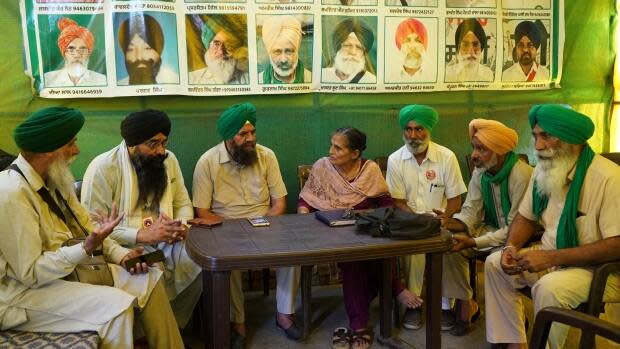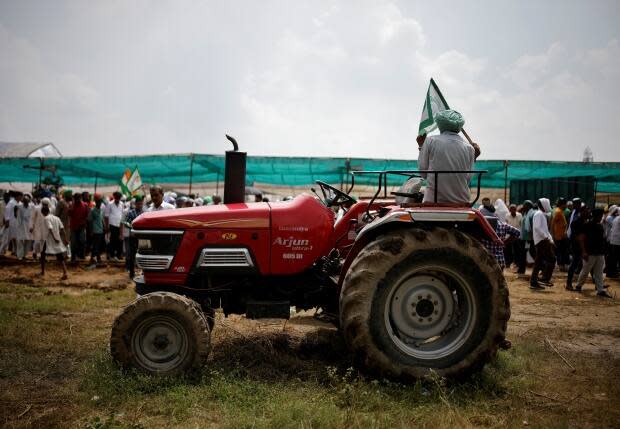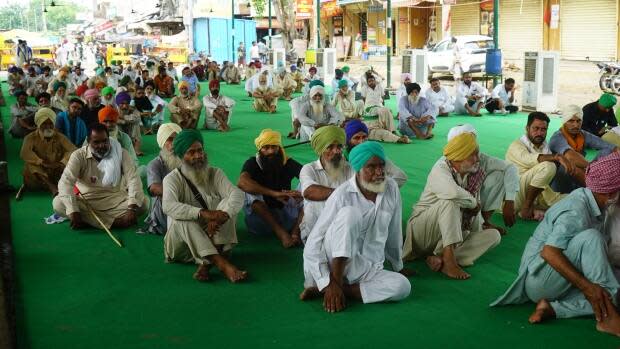India's protesting farmers set sights on key state election

The mission for the group of Indian farmers sitting in a makeshift tent at a protest camp near the Indian capital of New Delhi is crystal clear.
The farmers are huddled to reinvigorate their months-long fight against controversial new farming laws passed by Prime Minister Narendra Modi's government last year.
Modi's Bharatiya Janata Party is "running scared and on the defensive," said Jasbir Kaur Natt, a member of the Tikri border action committee that plans local protests.
"We have decided that we will hurt the BJP and defeat them" at the polls in next year's state election in Uttar Pradesh, she said.
Kaur Natt is convinced of this after two events this month that have galvanized the farmers' protests following a lull in demonstrations while India was battling a devastating second wave of the coronavirus pandemic in the spring.

The first was a massive gathering that organizers called the largest since the protest movement began last November, which saw tens of thousands of farmers rally in Muzaffarnagar in Uttar Pradesh.
The predominantly agricultural state is India's most populous and has a state assembly election set for early next year — a fact that hasn't escaped the farmers, who are preparing for a battle. The state is controlled by the BJP.
"We'll intensify our protest by going to every single city and town of Uttar Pradesh to convey the message that Modi's government is anti-farmer," one of the more prominent union leaders, Rakesh Tikait, told the crowd gathered at Muzaffarnagar on Sept. 5.
Farm leaders are also calling for a countrywide strike on Sept. 27, to draw more attention to their protest against the new laws.

For nearly 10 months, India's farmers have been fighting three new laws passed without consultation last year. The farmers say the laws will destroy livelihoods and leave smaller farmers vulnerable to being squeezed out by large corporations.
The Indian government insists farmers will be better off under the new legislation, which loosens rules around how they can sell their goods. The government has also pledged to improve incomes, but farmers want the laws repealed.
The sustained protests have created a tricky situation for the Modi government. Farmers are an important voting bloc in the country, with slightly less than 60 per cent of Indians dependent on the agricultural sector to earn a living.
Demonstrations entrenched
Numerous rounds of talks between government officials and agricultural union leaders have failed to break the impasse and the demonstrations are now entrenched, with quasi-permanent protest camps still located at three locations that ring the Delhi national capital region They first materialized in late November 2020.
The camps are a "well-oiled system," said Dalwinder Singh, a farmer from Haryana state who has been living at one of the sites for 10 months, only leaving occasionally to tend to his crops.
He sees it as his duty to stay at the site to promote the farmers' wider goal: to keep attention on the issue and pressure on the Indian government.
WATCH | India's farmers say they won't back down until new farming laws are repealed:
Singh was also at the second protest that has injected new energy into the farmers' movement this month: a sit-in that lasted several days outside a government office in Karnal, in Haryana state.
The city was the site of a protest in August that turned violent, with police officers charging at protesters with their batons. Ten people were injured, but anger against the authorities intensified when a video went viral in which a government official is heard telling police officers to "smash the heads" of protesting farmers.
"The fight for Karnal was very important," Singh told CBC News. "We had to prove a point."
The farmers got what they wanted: an inquiry will look into what happened and the bureaucrat seen in the video has been placed on leave until the investigation's report is released.
"We got justice," Singh said. "It's obviously given us a big boost."
'A major factor'
For agricultural policy analyst Indra Shekhar Singh, what happened in Karnal is a "litmus test" of the potential the farmers have to disrupt local politics because of how quickly the state government gave in to the farmers' demands.
With five months to go until the state election in Uttar Pradesh, he believes the farmers have both the time and the will to sway voters.

"For the first time, farmers will be a major factor and a major pressure group in the elections in Uttar Pradesh," said Shekhar Singh, a commentator formerly with the National Seed Association of India.
"There is a very high probability that the BJP will face a strong resistance."
The resistance is building at the Tikri protest camp, where Kaur Natt couldn't keep the smile off her face as she looked back on the last few weeks.
'A shot in the arm'
"The Muzaffarnagar [rally] was a shot in the arm," she said.
"It is going to be 10 months since we have been sitting here," she said, while adding quickly that the farmers have the time and patience to keep at it. "One thing is clear: we will not budge until these laws are repealed."

That same determination is what keeps 90-year old Mahender Sangar going. He now spends his days living in a tent with nine other people.
"This is my life now," he told CBC. "You can't afford to insult the farmers the way this government has, so I've decided to make this my home until we win this fight."

